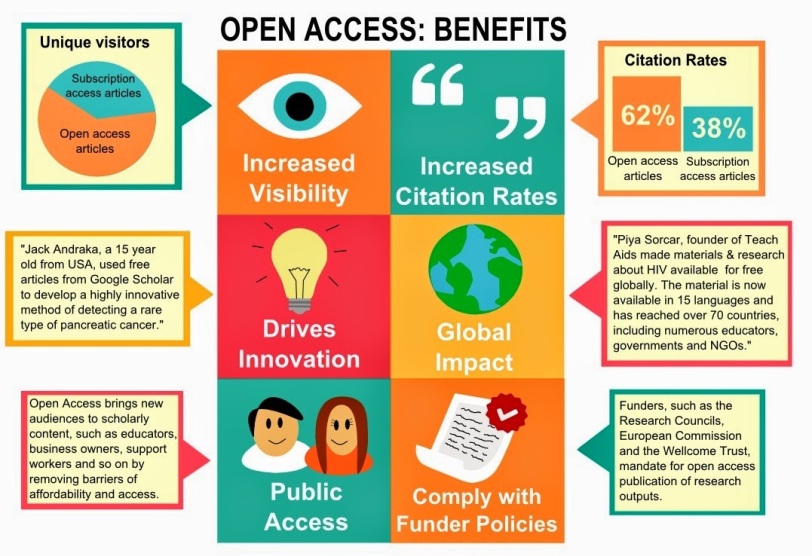Initially, I focused on the academic content producers of research articles when I first read on this topic, whereby open access to these online materials has made information more easily accessible, especially for people who have limited capital or under any other socio-economic factors such as age, gender and race. Below are some of the advantages to open access:

This video below will help you better understand the concept of Open Education Resources (OER’s) and how it has change the way of learning.
I am definitely supportive of open access to academic content because it has a greater advantage to the society at large. I believe that underprivileged people should be given education even if they cannot afford it. However, like everything in life, there is always a good side and a bad side.
The disadvantages to open access publication are that authors, perhaps through their employer or a research grant, is responsible to cover the costs of publication. This discourages them from going open access. If everything is free online, what does the researcher or publisher earn for a living? Unlike reputable publishers who does not have this problem, there is a lack of quality control in open access journals. As publishers’ revenue comes from publication fees, they are motivated to publish more articles to cover their cost and earn more revenue. Thus, having a negative impact on the overall quality. Lastly, there were arguments that traditional paid access models ensure publishers are adequately compensated for the substantial role they play, yet, there is no validation if the open access models can sustainably support the research publication infrastructure in the long term.
On further contemplation, I realised that content producer of any creative or original are also exposed to similar advantages and disadvantages. For example in the Music industry, with the current technology, it is easy to download the songs you like for free anywhere. People are starting to expect music to be downloaded for free. Despite the contrary, I feel that music is not an entitlement. Artists should be paid. As a music lover myself, I purchase and collect albums to show my support to the artists, so should all music lovers out there.
It is impossible to hunt and shut down all music download websites or apps, but what I think the artists can do is to get copyrights and license to their work, so they can collect royalties for the music they composed. Same to all content producers, if you feel that your work has a certain quality and value that can appeal to a large audience, you should not feel obliged to make it ‘free for all’.
(440 words)
References
- Advantages and Disadvantages of Open Access. (n.d.). Retrieved November 11, 2015, from http://www.edanzediting.com/blog/advantages_and_disadvantages_open_access#.VkMBpq4rJsM
- http://libguides.aston.ac.uk/openaccess (Image)
- https://www.youtube.com/watch?time_continue=4&v=cHQp33rbg5k (YouTube)
- (n.d.). Retrieved November 11, 2015, from http://www.rcuk.ac.uk/RCUK-prod/assets/documents/documents/RCUKOpenAccessPolicy.pdf
- (n.d.). Retrieved November 11, 2015, from http://www.theguardian.com/higher-education-network/blog/2012/nov/22/open-access-research-publishing-academics?fb=optOut
-
Should music be free? (n.d.). Retrieved November 11, 2015, from http://www.debate.org/opinions/should-music-be-free
Good afternoon Yilin,
I noticed you had explored towards the perspective of how open access would benefit individuals belonging to different demographics such as pay level, age, gender and race specifically towards education. The concept of Open Education Resources (OER) is particularly intriguing and I do agree with you that every single individual deserves an equal learning opportunity.
To add onto the benefits of OER, universities and colleges are given an opportunity to include updated articles, textbooks and resources into their lesson plans. Educators would be able to incorporate more relevant and up to date information for their students! Would you agree with my stand?
On the contrary, from a macro perspective, would OER be effective in improving educational standard for less developed countries such as Africa and Afghanistan? As cited from tonybates, it would be arrogance to assume that transfer of learning is achieved from one country and dumping it into another is as simple as giving away free coal. Would it truly benefit less developed countries whom are arguably the ones who are really in need of raising education standards?
Do let me know your perspective on these questions! Thank you for sharing, a very well thought post.
LikeLike